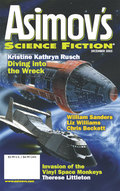
| Editor: | Sheila Williams |
| Issue: | Volume 29, No. 12 |
| ISSN: | 1065-2698 |
| Pages: | 144 |
This issue was full of solid, plot-based science fiction stories, if not horribly original ones, starting off with several post-apocalyptic settings and concluding with a good deep space exploration novella by Kristine Kathryn Rusch. Sheila Williams's editorials are usually interesting but not too compelling, and this was no different, but Silverberg's column is excellent as always and James Patrick Kelly does an interesting rundown of the web presences of SFWA grand masters. Peter Heck didn't review many books that were both interesting and new to me this time, but his book reviews were competent (if a bit heavy on plot synopsis).
"To the East, A Bright Star" by James Maxey: The first of this issue's two post-apocalyptic stories set in the aftermath of significant ocean rise and global warming, this story starts out with a surreal image and turns into a nicely barbed tragedy of sorts. From the beginning, the viewpoint character knows exactly when he's going to die. The cause is predictable when finally revealed, but I liked the honesty of the ending. No last-minute swerves away from the setup here. (7)
"Amba" by William Sanders: Also set in a world drastically changed by global warming, this is a combination Siberian hunting story and a spy thriller. The changed climate and its resulting effect on politics is the only science-fictional element. I liked the thriller story, mostly because of the cynically competent main character. (We're not exactly breaking new fictional ground here, but Sanders does it competently.) Unfortunately, the ending falls apart, or rather fails to build up to anything interesting. The shadowy scientists that appear to be so important only know things by accident, the tiger at the center of the opening sequence has no real purpose in the plot. Disappointing after a good start. (6)
"Ikiryoh" by Liz Williams: The secret daughter of the goddess queen is sent to a kappa, a frog-woman, for care. She suffers from seizures and strange moods, but no one will tell the kappa why until she brings the child on a whim to the city for a celebration. There isn't much to this very short story and the revelation doesn't break new ground, but the kappa's characterization carries the story well. (7)
"The Perimeter" by Chris Beckett: Unlike the previous two stories, this is a great idea story hampered by some annoying characters. It's set in a virtual world where status is defined by ones resolution. For all, that is, except the most high-resolution creatures, the rare phantoms who just aren't right, who aren't truly real. The viewpoint boy discovers a very high-resolution white hart that seems to ignore him completely, and in following the hart, meets a woman who explains the nature of the world. I really liked the idea, even with the at times unoriginal Matrix overtones; I wasn't as fond of how annoying the boy and woman were and how strained the woman's conflicting motives are. (7)
"Earthtime" by Damian Kilby: This one didn't work for me. A woman was pulled out of time to become some sort of travelling soul helping a mystical god-like being; at the start of the story, she is returned to the time where she left, feeling disconnected and left to pick up her life. This could have worked (although it would have been hard), but I never connected with her, never cared enough, and found the point of the story too shallow. (4)
"Diving into the Wreck" by Kristine Kathryn Rusch: This is a great classic science fiction story. The first-person narrator is the captain of a salvage ship, a ship that finds abandoned wrecks in deep space and then explores them, looking for abandoned and forgotten technology from past millenia of human life in space. It's very dangerous work, and the captain has found what might be the most dangerous wreck of all, a ship from the deep past of Earth's forgotten technology, light years away from where it should be. The story is a great mix of interpersonal tension, technology, and a vivid picture of a life in deep space. I think it's marred a bit by a slightly disappointing ending (and in lack of explanation, Rusch diverges the most from the story's strong hard SF roots), but it's still a thoroughly enjoyable story. (8)
Reviewed: 2006-03-12